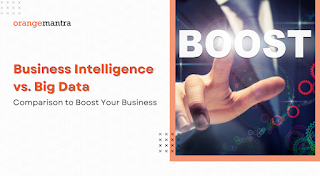Whether you own a startup or a business, in-depth knowledge is essential for success. And we have business intelligence and big data analytics to help the company overcome any obstacles. However, depending on their type or source, both processes may differ. But, you can seek additional guidance from business intelligence consulting services. And if you want to learn more about their differences, let's get started.
An overview of business intelligence
Data can be in any form i.e, structured and semi-structured. So, business intelligence collects and cleans the data. And it uses different SQL databases or data warehouses to store them. BI solutions offer great insights to businesses with forecasts. Moreover, with changing landscapes, BI has taken over the major industries. Because it views data from the past and presents to give future predictions.
An overview of big data
As the name suggests, big data handles enormous complex data. You manage them with a traditional database. Big data is sometimes called the future of BI. Big data revolves around three broad features i.e, volume, velocity, and variety. It means:
Evolution of masses of data
Transit speed of data
Diversity of data sources
So, it allows you to use robust tools for the decision-making process.
Business intelligence vs. big data: A comparison to know
Here are comparison factors between the promising data analytics processes.
Source
BI solutions mostly deal with internal data sources. Such as ERP, CRM, transactions, or any other type of data. On the contrary, big data uses external and internal data sources. Because it takes help from conventional databases and also social media. Moreover, it also extracts data from websites, sensor data, weather data, IoT data, etc.
Purpose
Both the data analyzing processes aim to offer robust forecasts to businesses. Furthermore, it provides them with valuable insights into massive datasets. The only difference is big data operates large volumes of data.
But BI solutions are concerned with a broader spectrum of present market affairs. Such as marketing analytics, sales report, and dashboard. etc. But if want to classify your users and forecast trends then big data is for you.
Components
BI and big data vary on the part. Because big data analytics comprises different forms and types. Such as data storage, processing, and decision-making. But the components of BI are slightly different. Such as data warehouse, OLAP, reporting, dashboards, etc. You can consult business intelligence consulting services for more guidance.
Techniques
Big data uses different kinds of predictive analysis techniques. Such as regression, clustering ad classification. Here the mostly used tools are Hadoop, NoSQL databases, and Apache Spark. On the contrary, BI solutions stand on descriptive techniques. Such as trends, drill-down, and slice-and-dice. And the tools it uses are RDBMS, Google analytics, and Microsoft Power BI.
Volume
As mentioned earlier, data volume is one of the theories of big data. So the capacity of data it works on is higher than BI. Because business intelligence works on the stored and structural form of data. However, big data follows a different approach. It gathers data from images, data, social media, websites, etc. You can consult business intelligence consulting services for more guidance.
Characteristics
Already discussed big data analytics characteristics are velocity, volume, and variety. As it takes information from any place, form, or type to forecasts business trends, etc. But the characteristics of business intelligence are accessibility, precision, and relevancy. Because it takes references from the present data to make forecasts with accuracy.
Conclusion:
Although both data analytics approaches help businesses. But the sources, components, and tools differ to analyze data differently. For more consideration, consult business intelligence consulting services for your business.

No comments:
Post a Comment